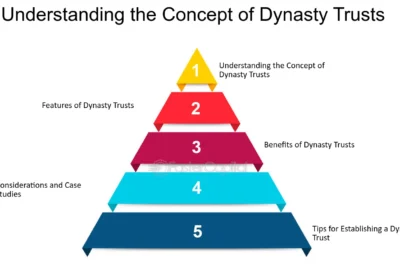
Introduction:
Dynasty trusts are powerful estate planning tools that enable individuals to preserve wealth and provide for future generations in a tax-efficient manner. These trusts offer numerous benefits, including asset protection, continuity of wealth, and the ability to minimize estate taxes over multiple generations. In this guide, we will delve into the intricacies of dynasty trusts, exploring how they work and the key considerations involved.
What is a Dynasty Trust?
A dynasty trust is a long-term, irrevocable trust designed to hold and manage assets for multiple generations. Unlike other types of trusts that may have a limited lifespan, dynasty trusts can potentially last for centuries, allowing wealth to accumulate and benefit numerous descendants over time.
How Does it Work?
-
Establishing the Trust:
- The process begins with the grantor, the individual creating the trust, transferring assets into the trust. These assets can include cash, securities, real estate, business interests, or other valuable property.
- The grantor selects a trustee to oversee the administration of the trust and make decisions regarding investments, distributions, and other matters outlined in the trust document.
- The trust document outlines the terms and conditions of the trust, including who the beneficiaries are, how assets are to be distributed, and any specific instructions or provisions the grantor wishes to include.
-
Managing the Trust:
- The trustee is responsible for managing the assets held in the trust in accordance with the terms set forth by the grantor.
- Investments made by the trustee should aim to preserve and grow the trust assets over the long term, taking into account the needs of current and future beneficiaries.
- The trustee may have discretionary authority to make distributions to beneficiaries as outlined in the trust document. This discretion allows the trustee to adapt to changing circumstances and needs over time.
-
Tax Considerations:
- One of the primary advantages of dynasty trusts is their ability to minimize estate taxes over multiple generations.
- Assets transferred to the trust are removed from the grantor’s taxable estate, potentially reducing or eliminating estate tax liabilities upon the grantor’s death.
- Additionally, dynasty trusts are often structured to leverage generation-skipping transfer (GST) tax exemptions, allowing wealth to pass to grandchildren or more remote descendants without incurring additional taxes.
Benefits of Dynasty Trusts:
-
Wealth Preservation:
- Dynasty trusts provide a mechanism for preserving family wealth over multiple generations, shielding assets from potential creditors, lawsuits, or other threats.
- By keeping assets within the trust, rather than distributing them outright to beneficiaries, the trust can continue to grow and provide financial security for future generations.
-
Tax Efficiency:
- Through strategic estate planning, dynasty trusts can minimize estate taxes and potentially avoid generation-skipping transfer taxes, allowing more of the trust assets to pass to beneficiaries intact.
- By taking advantage of tax-deferred growth opportunities within the trust, beneficiaries may also benefit from increased wealth accumulation over time.
-
Asset Protection:
- Assets held in a dynasty trust are typically protected from the claims of beneficiaries‘ creditors, divorcing spouses, or other potential threats.
- This protection can provide peace of mind to both grantors and beneficiaries, knowing that the trust assets are secure and insulated from external risks.
Considerations and Limitations:
-
Irrevocability:
- Once established, dynasty trusts are generally irrevocable, meaning that the grantor cannot modify or revoke the trust without the consent of all beneficiaries and/or a court order.
- It’s important for grantors to carefully consider the terms of the trust and seek professional advice to ensure that they align with their long-term goals and intentions.
-
Administrative Costs:
- Establishing and maintaining a dynasty trust can involve significant administrative costs, including legal fees, trustee fees, and investment management expenses.
- Grantors should weigh these costs against the potential benefits of the trust and consider whether they are willing to commit resources to support its ongoing administration.
Conclusion:
Dynasty trusts offer a powerful solution for individuals seeking to preserve wealth and provide for future generations in a tax-efficient manner. By leveraging the benefits of long-term, irrevocable trusts, grantors can establish a lasting legacy that benefits their descendants for generations to come. However, establishing and maintaining a dynasty trust requires careful planning and consideration of the associated costs and complexities. Working with experienced estate planning professionals can help ensure that the trust is structured in a manner that aligns with the grantor’s goals and maximizes its potential benefits.
FAQ’s:
- What is a Dynasty Trust?
A: A Dynasty Trust is a long-term irrevocable trust designed to transfer wealth from one generation to another while minimizing estate taxes and protecting assets from creditors and divorcing spouses.
- How does a Dynasty Trust work?
A: A Dynasty Trust works by transferring assets into a trust, which are then managed by a trustee for the benefit of beneficiaries, typically descendants, for multiple generations. The trust can exist for many years, even indefinitely, depending on state laws.
- What are the key benefits of a Dynasty Trust?
A: The benefits of a Dynasty Trust include:
- Estate tax minimization.
- Asset protection from creditors and divorcing spouses.
- Preservation of wealth for multiple generations.
- Control over distribution and management of assets.
- Potential for generation-skipping transfer tax savings.
- Who typically creates a Dynasty Trust?
A: Dynasty Trusts are commonly created by wealthy individuals or families who wish to preserve and transfer their wealth to future generations. However, they can be established by anyone with substantial assets and a desire to maintain control over their wealth.
- What assets can be placed into a Dynasty Trust?
A: Virtually any asset can be placed into a Dynasty Trust, including cash, real estate, stocks, bonds, businesses, and valuable personal property.
- Can beneficiaries access the assets in a Dynasty Trust?
A: Beneficiaries typically do not have direct access to the assets in a Dynasty Trust. Instead, distributions are made according to the terms set forth in the trust document by the grantor.
- How are taxes handled in a Dynasty Trust?
A: Dynasty Trusts are structured to minimize taxes, including estate taxes and generation-skipping transfer taxes. However, income taxes may still apply to trust earnings, depending on how the trust is structured and where it is established.
- Can a Dynasty Trust be changed or revoked?
A: In most cases, Dynasty Trusts are irrevocable, meaning they cannot be changed or revoked once established. However, some flexibility can be built into the trust document through provisions such as trust protectors or decanting.
- What happens if the laws regarding Dynasty Trusts change?
A: If laws regarding Dynasty Trusts change, existing trusts may be affected. It’s essential to work with knowledgeable legal and financial advisors to ensure that your Dynasty Trust remains compliant and effective in light of any legal changes.
- Are Dynasty Trusts only for the ultra-wealthy?
A: While Dynasty Trusts are often associated with wealthy individuals and families, they can also be beneficial for those with substantial assets who wish to pass on wealth to future generations while minimizing taxes and protecting assets.







